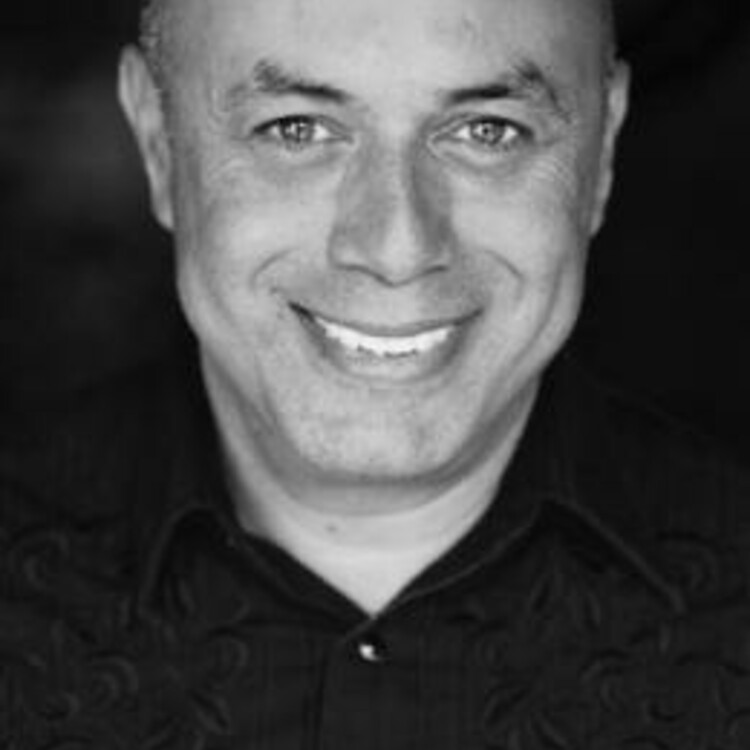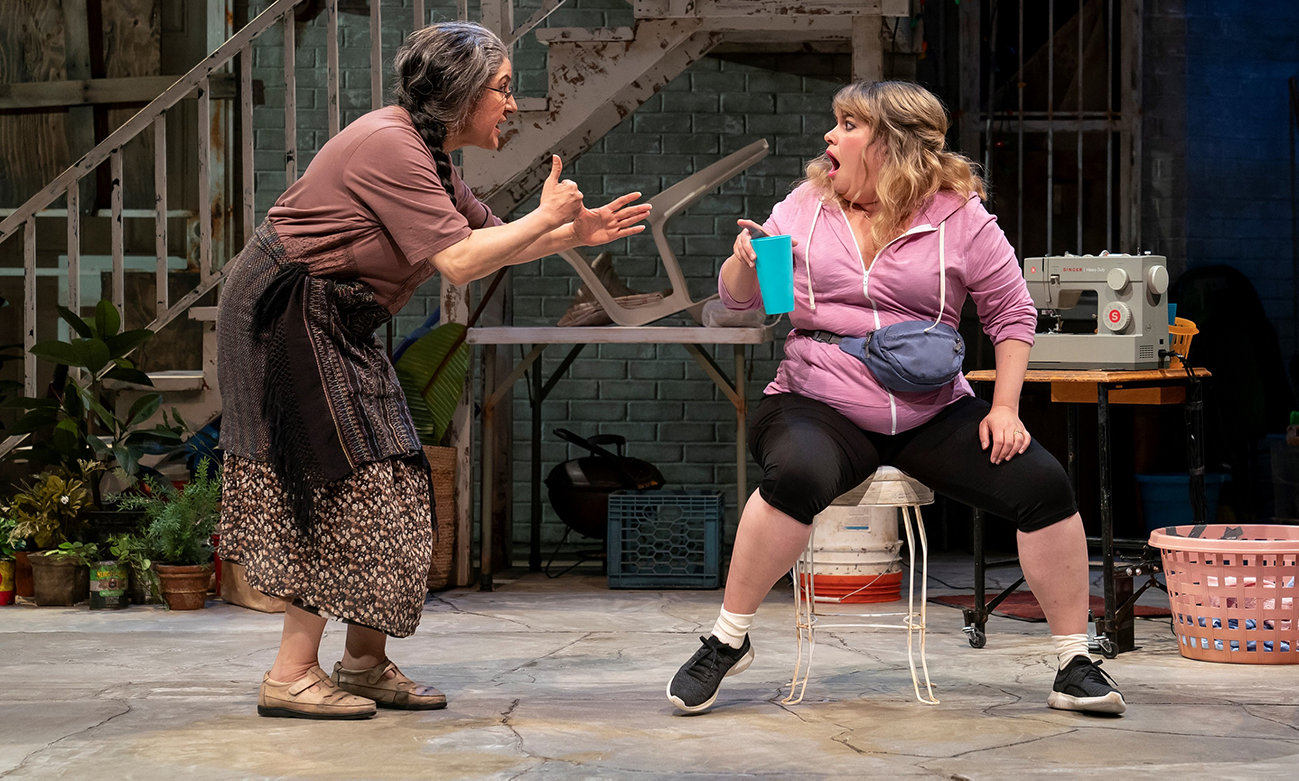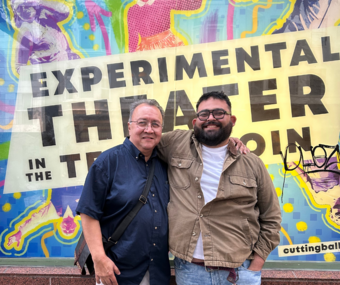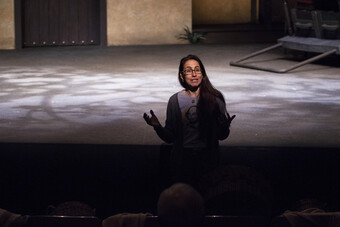Herbert: By mid-March, most of the regional theatres in the United States stopped performing and rehearsing shows because of the CDC recommendations limiting public gatherings. I was in my second week performing Culture Clash: Still in America at Berkeley Repertory Theatre and the new artistic director, Johanna Pfaelzer, had to make the difficult decision to stop our show and halt the rehearsals for School Girls, which was about to enter tech week.
What happened at the theatre you were working with?
Karen: I had been at the Oregon Shakespeare Festival (OSF) for a couple of weeks, rehearsing and rewriting my American Revolutions world premiere The Copper Children, which was being directed by Shariffa Ali. It was the culmination of four years of work. We had started previews on 29 February and then I flew out to Cincinnati Playhouse (CPH) for previews of my play Destiny of Desire with director Jose Luis Valenzuela, before flying back for the opening of The Copper Children on 7 March. Three days later, both shows were shuttered.
It is Nataki Garrett’s first season as artistic director at OSF and she is implementing such exciting energy and initiatives, and Blake Robison, the artistic director at CPH, had taken a chance on my musical about telenovelas. I feel so bad (weirdly guilty?) that COVID-19 circumstances made it so I couldn’t fulfill the promise of each play with these supportive leaders, wonderful theatres, and audiences. I am sad that the actors who worked so hard at remembering every line (and all those darn rewrites!) didn’t get a chance to have more than three performances. I am grateful that I at least got to see them, that the work of these fine directors, actors, designers, and crew members all existed on stage. It was real, and I am sad it’s over.
Evelina: We were moving full speed ahead preparing our season for the Latino Theater Company at the Los Angeles Theatre Center (LATC) with marketing, casting, building sets, and more. On 11 March, while we were in callbacks for Just Like Us by Karen Zacarías, we found out about the European travel ban—and we had two shows coming in from Spain. That was the first hint that we would have to adjust our season. A few days later, it became clear that we would have to postpone the entire season until further notice when Los Angeles County banned gatherings of fifty people or more.
This was not only a blow to our company and staff but also to the businesses around the LATC that our patrons frequent: parking, bars, restaurants. As an independent theatre of color, it is never easy. Losing our ticket sales and rentals for this season and potentially longer could be devastating. We are waiting to see where this goes before deciding how to move forward. We may push plays into the summer without the European companies or we may just move into our scheduled fall season.
Eventually it is incumbent on the serious writer to take this moment seriously and write about the challenge.
Diana: I teach playwriting at South Coast Repertory, and at the request of my students we went online before it was a mandate. All other classes were cancelled, youth and adult. Franklin & Marshall College went online, cancelling the college premiere of my play Policarpa (ironically about a plague/virus), and Playwrights’ Arena cancelled the world premiere of my play Fabulous Monsters.
Oliver: I’m a professor at USC’s School of Dramatic Arts and an associate dean twice over, and we were deep into our spring semester when COVID-19 hit. The biggest jolt to my system involved shutting down our student productions and figuring out how to finish out the semester by teaching online. This isn’t easy for a drama school!
My heart breaks for all the young actors and playwrights with culminations and productions that had to be cancelled and postponed. In terms of my own work, I had to postpone the staged reading of my newest play, The Dragon Tree, at the Wallis Annenberg Performing Arts Center. But it seems like a small sacrifice.
Herbert: Now that most of us are home and not working closely with other artistic collaborators, what is your mood? What are you thinking about writing? Or is it too difficult to work on something?
For me, I am producing short daily videos called “Lunch Breaks with Herbert Sigüenza” for San Diego Repertory Theatre, where I am in residence. I let people know what I’m cooking for lunch and what is cooking in my head regarding new work. This is a way for us to stay connected and engaged with our audience and donors.
Oliver: In some ways, this crisis is a great opportunity for writers. Just living life in the best of conditions is a challenge, but now the challenge is really personal. It’s hard—almost impossible—to collaborate, even with virtual technologies, so you have to be alone with yourself and your feelings, not to mention your often dark thoughts. It’s awfully easy to take an edible and zone out (and I’m not against that), but eventually it is incumbent on the serious writer to take this moment seriously and write about the challenge.
I don’t mean that you have to write about COVID-19 directly (although if you want to, go for it), but that you need to take whatever you are writing and test it against the forces that are bigger than we are—the acts of God that thwart our plans. Take your main characters and test them against the forces we are up against now: division, loneliness, economic strain, even illness itself.
If you’re going to be a writer now, then the writing has to matter, and it needs to be a mirror that reflects our moment somehow.
Alvaro: Maybe it’s because I am mentally exhausted with what’s going on, but I have been utilizing this time to reconnect by phone with people I don’t talk to that often. I am also using this time to read all the books I managed to load onto my Kindle as well as the one I have had on my shelf since undergrad. I have hopes of being able to write during this time but at the moment it isn’t happening. Instead of forcing it, I just pick up another book. I am also figuring out how I can start offering free mini workshops focusing on adaptations and writing theatre for young audience plays.
I have lost thousands of dollars of work. (…) There’s nothing on the horizon. (…) At the moment I am relying on unemployment.
Luis: I am a gay man of a certain age who lives alone, and I have been alone for a long time. This is the first time in my entire life where I have felt that being alone does not feel good. I am also very lucky, because although going online is not my best talent, I have about seventy USC students who need me to be present, empathetic, professional, and there for them. I am teaching four classes on Zoom and I still have about twenty-six full sessions to go. But we are artists and that puts us in the avant-garde. The only constant of our art is that we change. And I am doing that in ways that are surprising even to me.
Evelina: As a playwright, my first thought was: “I have to stay in, I’ll write a play.” It hasn’t happened yet, but I hope it does. I’m thinking about blogging because there is so much to write about: this time in history, fear, the appreciation of life, reflection. I woke up the other morning thinking, “Man, this shit might kill us.” And we have so much more to do.
Herbert: How are you surviving economically? Some of us have writing commissions and some of us don’t. Some of us teach at institutions. Some of us have partners who are still working and some have been laid off. In my case, I am very fortunate to have a three-year playwright-in-residence grant from the Andrew W. Mellon Foundation so I have a consistent salary. Thank goodness!
Karen: Both my husband and I are self-employed, and 2020 was looking to be the best financial year of my twenty-five-year career: Destiny of Desire in a three-way co-pro, The Copper Children slotted for a full run, and several productions of Native Gardens, Just Like Us, and Ella Enchanted. All of that has been wiped away. It’s both emotionally and financially tough. We have three kids—one heading to college—a mortgage, health insurance… The prospect of making royalties this year looks very, very dire.
Alvaro: I am an associate professor at the University of Wisconsin-Milwaukee. My wife, who also works in theatre, is a professor at DePaul University. We are very fortunate to have positions that allow us to continue to work while at home. In fact, this semester was the first time I was teaching all my classes online. Because of this, I have not had to scramble to figure out how to adapt.
Diana: I have lost thousands of dollars of work. All my upcoming work as a playwright is gone. I was slated to lecture at several universities—that income is gone. There’s nothing on the horizon. Hopefully my playwriting class will be a go, but that is a very small amount. At the moment I am relying on unemployment. I’m a hustler, though. Always have been. I just deposited a royalty check for my play Ghosts of Bogotá, and I’m crossing my fingers that a commission comes through. If not, any side gig will do. Maybe I’ll run for president.
Herbert: Large theatres are losing thousands of dollars a day by keeping their theatres dark. When they open again they will be cash strapped and will need quick-selling content. I fear they will resort to safe, tried-and-true shows. In my experience around the administration table, Latinx-themed work is always seen as “risky,” and as Latino and Latina playwrights, our opportunities were already limited before this. Am I just being paranoid? What do you think?
Luis: I don’t think we will come back to the same situation. Not every theatre and every artist will return. I see that happening now. There will always be room for us somewhere, but where?
I feel an incredible need to take my Chicano with me into new experiences. New ways of telling stories, and new stories to be told. I think this a time of cultural awakening too. If any theatre is thinking of coming back and picking up where they left off, shame on them! If we don’t learn something huge from this experience, we deserve the mediocrity that will follow.
Latinx theatre will flourish because of this. But not in the ways we think, definitely not in the traditional ways.
Alvaro: This is a great question that I am not sure I know how to answer. I do think the theatres that have committed to doing works by Latinx playwrights and other writers of color will continue to do this. Our voices are the future of theatre.
I also hope this will inspire some theatres to focus on producing works that celebrate the diverse voices in their community. How can they expect the community to support them if they have no history of celebrating our voices?
Lisa: You ask, “Will theatres consider Latinx work “risky” and produce what is “safe”? Fuck no. If this virus shows us anything, it is that the world is irrevocably, undeniably changed. For anyone who has ever believed in borders, this virus has had the last laugh. Trump and the old white men are gasping for air. And, yes, they will wreak more havoc before they go down. But even if they resort to martial law, even if they override our right to privacy… Their way of running the planet is dying.
But back to your question. Yes, whether in the theatre or via some new platform, we will see Latinx stories, and stories by women, and stories by people of color, because these are the voices “emerging” from this “emergency.” And the old voices, (“build the wall!”) are having their last coronaesque gasp.
Oliver: I see this pandemic remaking the theatre landscape. The industry needed to change, but this takes a sledgehammer to the whole thing. I remember how 9/11 threw the American theatre for a loop for minimum six months. I had a show that suffered the consequences then. Now? So much depends on changing the direction of the nation.
The New Deal in the 1930s included incentives for theatre artists and helped create some of our most consequential work. I’m not that optimistic about a new New Deal, but I do know that drama will be more important than ever and that we should not give up. We provide light in darkness and darkness in light. I said earlier that we ought to be mirrors to the moment, but we actually need to be prisms that bend the light and send it in unexpected directions that give us, on occasion, rainbows.













Comments
The article is just the start of the conversation—we want to know what you think about this subject, too! HowlRound is a space for knowledge-sharing, and we welcome spirited, thoughtful, and on-topic dialogue. Find our full comments policy here
While I'm disheartened that there are less film projectors today and noisier crowds, I very much want a dramatic screening than one at home. Individuals have been saying for quite a while cinemas will cease to exist. They haven't all that far and I don't believe it's probably going to work out. For more information visit here https://wikipagecreator.net/
Y'all are bringing tears to my eyes. This made my heart ache in despair and fear, yet shed some light of hope as well. I am both terrified and guilty. I don't know how to create and live, especially as a Latinx artist and college student right now. Not happy we're going through it, but relieved it's not all in my head.
So many heroes in one piece! I'm especially struck by Luis's comment
"If any theatre is thinking of coming back and picking up where they left off, shame on them! If we don’t learn something huge from this experience, we deserve the mediocrity that will follow."
I'm adding that to my mirror.
thank you for this inspiring piece-- and thank you all for your writing and powerful work